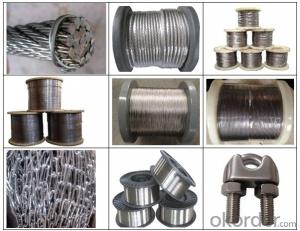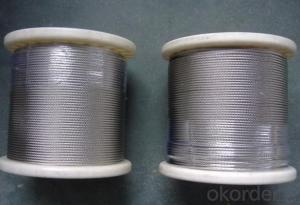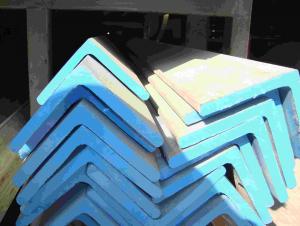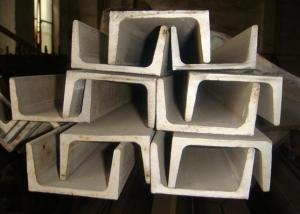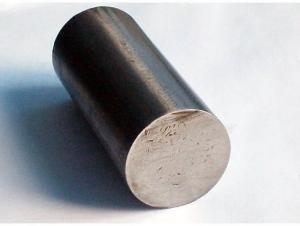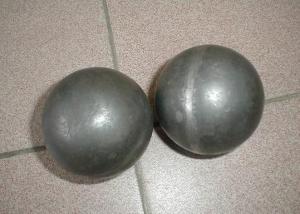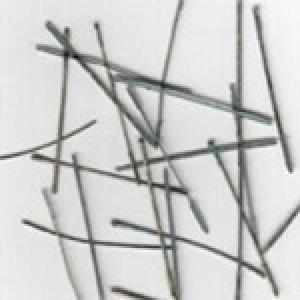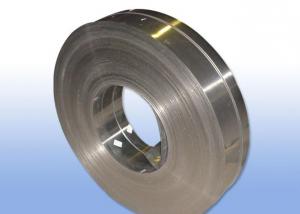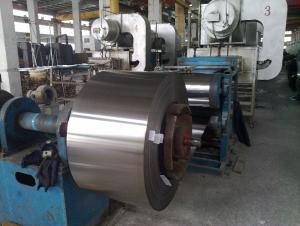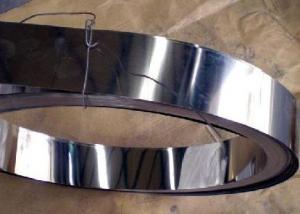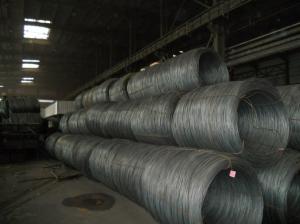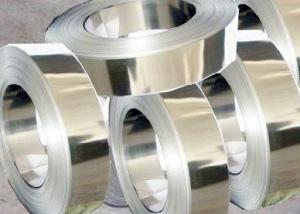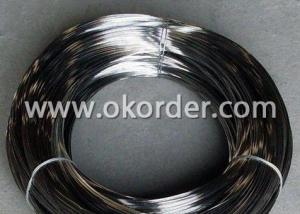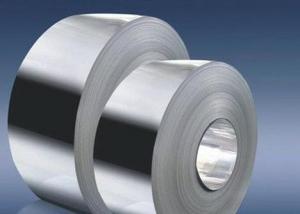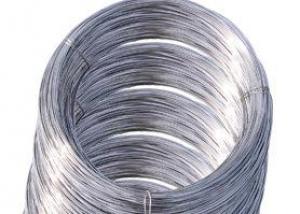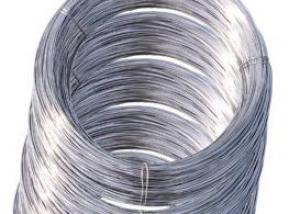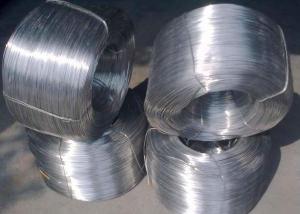Wire Galvanized Carbob Steel Wire for ACSR
- Loading Port:
- Dalian
- Payment Terms:
- TT OR LC
- Min Order Qty:
- 5 m.t.
- Supply Capability:
- 10000 m.t./month
OKorder Service Pledge
OKorder Financial Service
You Might Also Like
Item specifice
Wire Galvanized Carbob Steel Wire for ACSR
Quick Details
Steel Grade: | steel | Standard: | AISI, ASTM, BS, DIN, GB, JIS | Wire Gauge: | 1.24-5.50mm |
Place of Origin: | China (Mainland) | Type: | Galvanized | Application: | Manufacturing |
Alloy Or Not: | Non-alloy | Special Use: | Cold Heading Steel | Model Number: | wire galvanized steel for acsr |
Brand Name: | CNBM | wire galvanized: | wire galvanized steel for acsr |
Packaging & Delivery
Packaging Details: | Coil with plastic outside or according to customer's requirement. |
Delivery Detail: | 20 working days after receiving your order. |
Wire Galvanized Steel for ACSR
1. Material: Q195,Q235,45#,60#,65#,70#,72B,80#,82B,65Mn
2. Surface Coating: Galvanized
3. Characteristic: High tensile strength,small tolerance
Shiny surface, good corrosion prevention
4. Packing type:Spool or Coil
5. Application: Being used for stranded conductors in overhead power circuitry
6. Remarks during use and handling:
a. During transportation, handle softly and carefully, avoid bumping and damaging the steel wires. Moisture and rain prohibited. Steel wires must be stored in dry and well ventilated indoors
b. Pay attention to the direction of steel wires when paying-off. Be sure the spool or coil is rotating freely as to achieve identical tension of all the steel wires
c. In case of batch usage, the remaining should be repacked to avoid oxidizing of the surface
Technical parameters
Wire dia: 1.24-5.5mm; Tensile Strength:1290~1340Mpa
Nominal diameter (mm) | Tensile Strength | Stress at 1% Elongation | Twist | Elongation | Standard |
mm | Mpa | Mpa | Times/360° | Lo=250mm | |
1.24~2.25 | ≥1340 | ≥1170 | ≥18 | ≥3.0% | As per GB,EN,IEC,JIS,ASTM standard, as well as customer's request |
2.25~2.75 | ≥1310 | ≥1140 | ≥16 | ≥3.0% | |
2.75~3.00 | ≥1310 | ≥1140 | ≥16 | ≥3.5% | |
3.00~3.50 | ≥1290 | ≥1100 | ≥14 | ≥3.5% | |
3.50~4.25 | ≥1290 | ≥1100 | ≥12 | ≥4.0% | |
4.25~4.75 | ≥1290 | ≥1100 | ≥12 | ≥4.0% | |
4.75~5.50 | ≥1290 | ≥1100 | ≥12 | ≥4.0% |
NOTE:Providing engineer design as per cstomer's request.
Picture
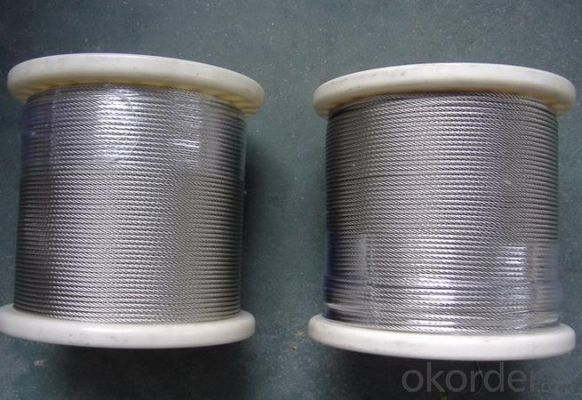
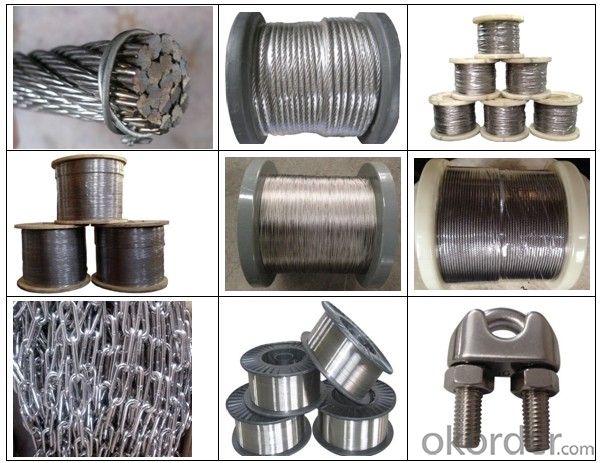
- Q:Can stainless steel wire be used for wire knitting or crocheting?
- Wire knitting or crocheting can be done using stainless steel wire. This material is highly versatile, possessing strength and durability that make it suitable for various crafting projects. Its shiny and metallic appearance adds a unique aesthetic, making it a popular choice for creating jewelry and decorative items. Furthermore, stainless steel wire is resistant to corrosion and tarnish, ensuring that your creations will endure and retain their quality over time. Nevertheless, it is important to be aware that working with stainless steel wire can be more challenging than other types of wire due to its limited flexibility. Specialized tools or techniques may be necessary.
- Q:What is stainless steel wire made from?
- Stainless steel wire is primarily made from an alloy of iron, chromium, and sometimes other elements such as nickel or manganese. This alloy is known for its exceptional resistance to corrosion and rust, making it an ideal material for applications where durability and hygiene are crucial. The specific composition of the stainless steel wire can vary depending on the desired properties and intended use. The addition of chromium forms a protective layer of chromium oxide on the surface of the wire, acting as a barrier against moisture and preventing oxidation. This results in a wire that is highly resistant to staining, rust, and corrosion, making it suitable for various industries including construction, automotive, medical, and food processing. Additionally, stainless steel wire can be further processed through various techniques such as drawing, annealing, or coating to achieve specific mechanical properties or surface finishes. The versatility and strength of stainless steel wire have made it a popular choice in numerous applications where strength, corrosion resistance, and aesthetic appeal are essential.
- Q:Can stainless steel wire be used for making musical instrument strings?
- Yes, stainless steel wire can be used for making musical instrument strings. Stainless steel is a popular choice for guitar, bass, and piano strings due to its durability, resistance to corrosion, and bright tone. It provides a long-lasting and consistent sound quality, making it suitable for musical instrument strings.
- Q:Can stainless steel wire be used for springs in the electronics industry?
- Yes, stainless steel wire can be used for springs in the electronics industry. Stainless steel is a popular choice for springs due to its excellent corrosion resistance, high strength, and good elasticity. These properties make stainless steel wire suitable for various applications in the electronics industry, such as connectors, switches, relays, and other electronic components that require reliable and durable springs. Additionally, stainless steel springs can withstand high temperatures and have good electrical conductivity, making them ideal for use in electronic devices.
- Q:Can stainless steel screws be heat treated?
- The key is to look at is the kind of stainless steel stainless steel screws, stainless steel consists of ferrite stainless steel, austenitic stainless steel, martensitic stainless steel, precipitation hardening stainless steel, if the former is two kinds, namely ferrite stainless steel and austenitic stainless steel screws are generally not strengthened by heat treatment, after two kinds of martensitic stainless steel, precipitation hardening stainless steel can be strengthened by heat treatment.
- Q:What are the benefits of using stainless steel wire?
- Using stainless steel wire for various applications offers several advantages. Firstly, it is renowned for its exceptional strength and durability, boasting a high tensile strength that enables it to withstand heavy loads and resist breakage. This makes it an ideal choice for construction, automotive, and industrial projects, where strong and reliable materials are required. Secondly, stainless steel wire exhibits a high level of resistance to corrosion and rust. This is attributed to the presence of chromium in the alloy, which forms a protective layer on the surface, effectively preventing rusting even when exposed to moisture or harsh environments. Consequently, stainless steel wire is highly suitable for outdoor applications or areas with high humidity or chemical exposure, such as marine environments or chemical processing plants. Additionally, stainless steel wire possesses excellent heat resistance properties, allowing it to endure high temperatures without deforming or compromising its strength. This makes it well-suited for applications involving high heat, such as the manufacturing of heat exchangers, furnaces, or electrical heating elements. Another advantage of utilizing stainless steel wire is its versatility. It can be easily formed, bent, or shaped without sacrificing its properties, offering numerous customization options. This flexibility renders stainless steel wire suitable for a wide array of applications, including mesh screens, wire ropes, springs, fasteners, and welding electrodes. Lastly, stainless steel wire is renowned for its aesthetic appeal, boasting a smooth and polished surface that imparts a modern and sleek look. This makes it a popular choice in architectural and interior design applications, such as balustrades, staircases, or decorative wire mesh. In summary, the utilization of stainless steel wire presents numerous benefits, including exceptional strength, corrosion resistance, heat resistance, versatility, and aesthetic appeal. These qualities make it a reliable and durable option for a diverse range of applications in various industries.
- Q:Is stainless steel wire suitable for wire rope swivels?
- Yes, stainless steel wire is suitable for wire rope swivels. Stainless steel is a corrosion-resistant material that can withstand harsh environmental conditions and maintain its strength and durability over time. Wire rope swivels are commonly used in applications where rotation or twisting of the wire rope is required, and stainless steel wire provides the necessary flexibility and strength for such movements. Additionally, stainless steel wire is known for its high tensile strength, which ensures the wire rope swivel can handle heavy loads and resist breaking or snapping under pressure. Overall, stainless steel wire is a reliable and suitable choice for wire rope swivels due to its corrosion resistance, flexibility, strength, and durability.
- Q:Can stainless steel wire be used for food processing applications?
- Yes, stainless steel wire can be used for food processing applications. Stainless steel is known for its corrosion resistance, durability, and cleanliness, making it a suitable material for various food processing equipment, such as mesh screens, conveyor belts, and sieves. It is also easy to clean and maintain, ensuring hygienic standards in the food industry.
- Q:What are the different types of stainless steel wire ropes used in cranes?
- Cranes commonly utilize various types of stainless steel wire ropes. Here are some examples: 1. The 7x7 Stainless Steel Wire Rope consists of seven strands, each comprising seven wires. It offers a balance between strength and flexibility, making it suitable for overhead cranes and similar applications that require both qualities. 2. Similar to the 7x7 construction, the 7x19 Stainless Steel Wire Rope has 19 wires in each strand. It provides better flexibility and is commonly used when the wire rope needs to bend around pulleys or sheaves. 3. The 6x19 Stainless Steel Wire Rope features six strands, each made up of 19 wires. It offers a favorable combination of strength and flexibility, catering to a wide range of crane applications. 4. For heavy-duty lifting applications, such as in large overhead cranes or gantry cranes, the 6x36 Stainless Steel Wire Rope is often preferred. It consists of six strands, each containing 36 wires, providing excellent strength. 5. The 1x19 Stainless Steel Wire Rope is characterized by a single strand with 19 wires. It offers high strength and minimal flexibility, making it suitable for tower cranes and applications that require a rigid and stable rope. These examples illustrate the diversity of stainless steel wire ropes used in cranes. Choosing the appropriate wire rope depends on factors like the specific application, load requirements, and environmental conditions. Careful selection ensures the safe and efficient operation of the crane.
- Q:Can stainless steel wire be used for wire rope tensioners?
- Yes, stainless steel wire can be used for wire rope tensioners. Stainless steel is a strong and durable material that is commonly used in various applications, including wire rope tensioners. It offers excellent resistance to corrosion, making it suitable for outdoor and marine environments where exposure to moisture and harsh conditions is common. Stainless steel wire rope tensioners provide reliable and long-lasting tensioning of wire ropes, ensuring their stability and strength.
1. Manufacturer Overview |
|
|---|---|
| Location | |
| Year Established | |
| Annual Output Value | |
| Main Markets | |
| Company Certifications | |
2. Manufacturer Certificates |
|
|---|---|
| a) Certification Name | |
| Range | |
| Reference | |
| Validity Period | |
3. Manufacturer Capability |
|
|---|---|
| a)Trade Capacity | |
| Nearest Port | |
| Export Percentage | |
| No.of Employees in Trade Department | |
| Language Spoken: | |
| b)Factory Information | |
| Factory Size: | |
| No. of Production Lines | |
| Contract Manufacturing | |
| Product Price Range | |
Send your message to us
Wire Galvanized Carbob Steel Wire for ACSR
- Loading Port:
- Dalian
- Payment Terms:
- TT OR LC
- Min Order Qty:
- 5 m.t.
- Supply Capability:
- 10000 m.t./month
OKorder Service Pledge
OKorder Financial Service
Similar products
New products
Hot products
Hot Searches
Related keywords
